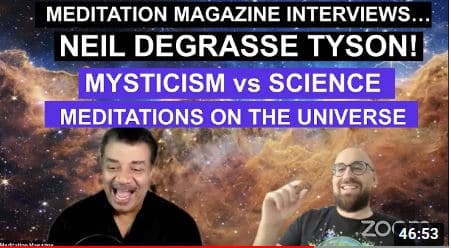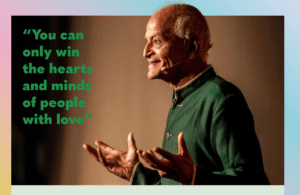We interviewed Neil deGrasse Tyson for the UNIVERSE issue of Meditation Magazine.
Full interview below:
Or if you want to read the article in our Universe Issue, check out our digital magazine or our print magazine subscription!
Neil deGrasse Tyson in Meditation Magazine
Below is a spread from Neil’s feature in The Universe Issue.
To get this issue (and also get 4 more issues in your first year), don’t forget to subscribe! Digital mag | Print magazine!

For the full transcript of this interview, read below:
Meditation Magazine: We are now streaming live on Facebook with Doctor Neil deGrasse Tyson, who is a pretty amazing astrophysicist. Neil is an author, one of the most popular scientific advocates in the world today. He studied physics at Harvard, got his PhD in astrophysics from Columbia University, hosted the Cosmo Series, which is a modern reflection of Carl Sagan’s older series of the same name, as well as the Star Talk series, which is ongoing. Neil is currently the director of the Hayden Planetarium in New York City, where he’s been serving since 1996. Thank you for being here, Neil and welcome to Meditation Magazine.
Neil deGrasse Tyson: Well, thanks for having me. I just want to add not that you asked that Hayden Planetarium was where I first discovered the universe when I was 9 years old as a city resident. Resident of New York City where we don’t have a relationship with the night sky when you live in a big city with tall buildings and back then, there was a lot of smog, light pollution. So, the sky created for me in the planetarium dome became an indelible force operating on the rest of my life.
Meditation Magazine: I actually can really relate to that. I grew up in Long Island and visited the Hayden Planetarium many times as a child and it really inspired me to be to sort of nerd out about the university.
Neil deGrasse Tyson: Yeah. It’s a nerd safe space. I bet you remember your very first trip there. I bet you remember that.
Meditation Magazine: Yeah, I really do. I remember the feeling of awe.
Neil deGrasse Tyson: I think it’s many people’s first virtual reality experience, Because the lights dim, the stars come out, and you’re transported in ways that no other thing that you could have done at the time would have enabled. So, I think that’s why people’s planetarium, first planetarium moments are remembered for a lifetime.
Meditation Magazine: Yeah. I want to get into more of that in a few minutes. I just want to introduce some things here. So, first, for anybody watching, you should know that this interview is, we’re going to take excerpts and we’re going to use them for the universe issue of Meditation Magazine which is all about our oneness with the universe, our connection with the universe. It’s going to be available in thousands of stores, 20 something countries around the world and if you’re a subscriber in the US or in Canada, you’re going to receive it in October and if another country is probably in November. If you’re not subscribed yet, you should go to “Meditationmag.com/subscribe”, so that you can get our print magazine.
I’d also like to introduce the thesis sort of that I have that I want to explore during this interview. So, modern meditators, we kind of live at the intersection between science and mysticism. While mystics and scientists may sometimes seem to be at odds with each other, we also have more in common than we may realize. We’re all nerds at heart. We look deeply into the universe and the nature of reality and we enjoy these explorations of existence. So, in those ways, we’re kind of brothers in arms, mystics and scientists. So, I want this conversation to explore that intersection between science, meditation, and mysticism. Where do we converge in our realizations? Where do we diverge in our epistemologist? But most importantly, let us marvel together in awe at this epic and beautiful universe and hopefully enjoy the ride.
Neil deGrasse Tyson: That’s quite a preamble too. But that’s a lot to cover in a half hour.
Meditation Magazine: Yeah, it is.
Neil deGrasse Tyson: Alright, we see how far we get.
Meditation Magazine: So, we’ll try to roll quickly. But first I actually wanted to just touch on some recent events before we get into the heavy stuff. The James Webb telescope. I’m so excited about it. I know you’re excited about it. I’m going to switch us into immersive view for a second so we can have a picture of it. A picture of, here you go. Look at that.
Neil deGrasse Tyson: I’m feeling it.
Meditation Magazine: Yeah, we’re talking the universe.
Neil deGrasse Tyson: Well, you’re right there too, right. You’re on this side of me. There we go.
Meditation Magazine: Yeah, you can see me.
Neil deGrasse Tyson: There we go.
Meditation Magazine: It’s cool, right. I love Zoom. It has all these weird features. But, the universe that we can see through the James Webb telescope, we’re now seeing so much more, and in more detail. Like, how do you feel about this? I know you’ve talked about all the cool things, about the James Webb telescope, but how do you feel about the fact that we can see so much more clearly now.
Neil deGrasse Tyson: So, I’m going to answer it in a way you might not be expecting, right. I would say since the industrial revolution, maybe late 1700s, certainly into the 1800s and then into the 1900s, 20th century. Exploration and discovery and the pace that that has unfolded has basically been exponential. What that means is at any given moment, if you jump into that timeline, at any given moment, everyone is saying, look at how advanced things are. Look at how detailed it is. Look at how far we’ve come, and that is the hallmark of an exponential curve. Everybody thinks they’re living in a special time.
So, correct. I will bask in the majesty of these images. This one is the Karina Nebula which is the infrared capabilities of the James Webb space telescope enables it to peer deep within, I got to use that a deeper voice, deep within, you’re going to say that word. You might as well ride it with everything for it. The infra enables you to probe deep into the gas clouds and see stellar nurseries that at this stage of their development are cloaked, shrouded by the very gas cloud that is birthing it. You would not otherwise be able to see that where not for the exquisite infrared detection abilities of this telescope. So, and by the way, just, I guess I can point to it, can I?
Meditation Magazine: Yeah.
Neil deGrasse Tyson: Almost. So, the spiky objects are simply stars that are much closer to us in our field of view. Can we see it now? Yeah. It’s just right there.
Meditation Magazine: Right here. I’ll make you bigger. There you go.
Neil deGrasse Tyson: Even bigger? So that one and then there’s one above my head there. And there’s some over your head as well. Take me down again. I’m too big.
Meditation Magazine: Yeah okay. Here we go. Alright. There we go. Now we’re small.
Neil deGrasse Tyson: Thank you. So those spikes, they look almost biblical, right. Because as stars are portrayed in frescos. Certainly, the star Bethlehem but that is an artifact of what occurs in the imaging when the starlight enters the telescope, the volume of the telescope, it actually diffracts around what we call the spider mounts of secondary mirrors and tertiary mirrors and this sort of thing. So, as the light moves into the hardware of the telescope itself, if the light is bright, it’s susceptible to those artifacts of the telescope and that’s why the spikes are in exactly the same place for each object in the image.
So, anyhow, point is, yes, this is amazing and it’s beautiful and its way better than the Hubble telescope. This is doing in just a few release images what Hubble like struggled to get to perfect over many, many years. However, when Hubble came out and it was giving us images, everyone was saying the same thing about Hubble. This is my point, okay. Yes, I will bask in the majesty of the data of the James Webb space telescope in just the same way I did when the Hubble telescope was finally fixed and was producing perfect images. Just the same way I did when the 200-inch Palomar telescope in California was producing these spectacular images of galaxies of Nebula. That was back in the 1950s and 60s and early 70s because that’s how old I am. So, be glad not simply that you are living in a special time, but that we are living overall in a time of exponential increase in cosmic scientific knowledge broadly especially cosmic knowledge.
Meditation Magazine: Thank you. I’m not even that concerned about whether our time is special or not. I’m more like just, wow, this is awesome. You know what I mean? I kind of like just try to enjoy it as we go along.
Neil deGrasse Tyson: By the way, I’m glad you’re using the word awesome in this context. Because the next generation, when you hear them use the word, it was like, it would be awesome if you pass the salt. It’s like, no, no.
Meditation Magazine: They are inspired by this passing of salt.
Neil deGrasse Tyson: Save it. But when we walk on Mars, alright. Leave some vocabulary for that.
Meditation Magazine: I’m looking forward to that. I’ve been watching for all Mankind. It’s a really good show.
Neil deGrasse Tyson: There you go.
Meditation Magazine: Yeah, I don’t know if you’ve been seeing that, but it’s great.
Neil deGrasse Tyson: I’ve saw bits of one, I know all about the series now.
Meditation Magazine: Yeah. So, I want to shift to talking about oneness, okay. The oneness of the universe and this is something that mystics have Talking about for thousands of years. Scientists are talking about it. I want to sort of find the commonalities here. You’re a person who is well known for talking about that we are stardust and we are atomically connected to all the atoms in the universe. So can you tell me what you mean by that?
Neil deGrasse Tyson: Sure. So, I think one of the great gifts of modern astrophysics to civilization, was the discovery. This was in a research paper published in the 1950s. So, right midcentury, it was a discovery that the elements that we see on the periodic table, the carbon, nitrogen, oxygen, silicon, iron. You just look at all those. You say, where did they come from? I remember asking my chemistry teacher in high school. ‘We find them in the Earth.’ I said, ‘Well, where did they come from before that?’ He didn’t have an answer. He should have and could have. He just didn’t. I’d later learned, yes, we astrophysicist have figured this out. These elements are forged in the cores of stars. Short-lived stars, that in their fusion, they merge light atoms to make heavy atoms.
The sun is doing this now, merging hydrogen atoms to make helium and releasing energy. Because the helium atom that comes out of it weighs less than all the hydrogen atoms that went in. Where did that mask go? It was converted into energy. And right according to E = MC2. The Einstein equation that we all have heard. So, there’s some stars that continue this. Hydrogen to helium, the carbon, the nitrogen and it goes all the way down the periodic table. Then in the star explodes, scattering this enrichment across the galaxy.
That enrichment infuses these gas clouds that are about to make a new generation of stars and planets that orbit them. And the planets are made of these heavy ingredients, and so is life. So, you ask where did we come from? We came from the stars. And for me the most poetic accurate way to say this is not only are we alive in the universe, the universe is alive within us. We we’re not just separate and distinct. We are one and the same. So, often people want to invoke the word special for being different. I’m special because no one else is like me. I have an opposite view. I say, we are all special, because we are one in the same of the stars in the canopy of the universe.
For me, that’s uplifting. It is a cosmic perspective that does the opposite of what so many other cosmic perspectives do. Most of them put you in your place. You’re not that big. You’re not living that long. You’re not that. You’re not, but really, we are a participant in the great unfolding of cosmic events. And as Carl Sagan wants mused. We might be thought of as a way for the universe to know itself. Because we’re not just self-replicating life. We have a consciousness but not only that, probably many animals have consciousness. Surely, most do. But we also have curiosity. About things that go beyond our own survival, and that curiosity takes us into the universe. And upon doing so, we can end up not only asking but answering questions about origins, about fate. about the future.
So, I celebrate this fact. That the powers of human, of the human mind can take us to where we are today, and we’re still going. Which is something I look forward to.
Meditation Magazine: Thank you. Thank you for that very eloquent expression of oneness with universe.
Neil deGrasse Tyson: I’m sorry, I’m giving long answers here. You want, I can tighten them up.
Meditation Magazine: We’ll tighten it a little.
Neil deGrasse Tyson: I’ll tighten it a little, I promise.
Meditation Magazine: I have a lot of questions. Okay, so that was beautiful though. Thanks you. So that’s one way, first of all, I love the Carl Sagan quote, “We are away of the universe, for the universe to know itself”. It’s interesting that Alan Watts, who’s sort of mystic, of the last generation, used very, very similar words. I think that, one of them looking through a telescope, and seeing it outwardly, and one of them looking sort of inwardly through meditation, both kind of seeing the same truth. That’s something that I want to explore more later in our conversation. But for now, I want to focus on the scientific perspectives on oneness. So, you mentioned the E equals MC squared, that the matter is converted into energy and energy is converted to matter and really, matter is energy, right. Because matter is just energy condensed to a slow vibration.
Neil deGrasse Tyson: Well, yeah, not to get pedantic and I hate getting pedantic or semantic.
Meditation Magazine: Pedantic, I love it.
Neil deGrasse Tyson: No, it’s semantic is the word, I was looking for. But mass is the fundamental thing, okay. Mass can manifest as matter. Mass can manifest as energy. That’s how you would think of that. And so, when we ask what’s the mass of that object, you’re going to add up the matter contest, the particles it’s made of, and you’re going to end up add up the energy to give you the total mass of what you’re describing. So, yes, it manifests and you can convert matter into energy and back and forth. That happens all the time in the universe. Even if it’s unfamiliar to your everyday life.
Meditation Magazine: So, if matter and energy are just two forms of mass, right. And they’re kind of, this universe is really just one big field of mass, right? Does that make sense?
Neil deGrasse Tyson: Yes, manifested in different ways. Creating and destroying within its own volume. So, yes, that’s the most oneness aspect of this as you can. If you want to be totally about one, there you have the entire universe is. a matter, motion, and energy. Just manifest.
Meditation Magazine: Yeah, matter, motion, energy, and really like you were saying, it’s all mass. Is that what you would call? Is that’s it’s the universe is the mass?
Neil deGrasse Tyson: Yeah, it’s true but it’s not always helpful because when the mass manifests as energy, it does different things than when it manifests as particles.
Meditation Magazine: You can break it down, right. We can break it down into its component part.
Neil deGrasse Tyson: Yes.
Meditation Magazine: But we could also see it as this oneness. So, we can have both perspectives.
Neil deGrasse Tyson: You can, I guess, scientifically, you want to have a point of view. Point of views are helpful when they give you insights into something you can calculate, something you can predict, something you can understand that has just happened. But to just run around and say, we’re all just one thing. It might give you sort of some spiritual fulfillment, but you can’t go out and say, okay, I’m going to use that information to land on the moon.
Meditation Magazine: I get you and this is actually a really great point. I mean, maybe there are multiple things that we can get out of different perspectives on the universe, right. We can get, like you said, spiritual fulfillment, you could call it like an emotional kind of connection with the universe by realizing that we’re one with it. Not just an emotional, it’s kind of like, there’s a transcendence there. It’s something that makes us feel infinite and it’s something that it’s a very powerful feeling.
Neil deGrasse Tyson: Yeah, and provided you not only know it but sort of think about it in a very positive way. There’s a lot of energy that destroys things, right. So, I think you want to take the right slice through that pie and reflect on it in ways that do give leave you at the end of the day smiling rather than crying.
Meditation Magazine: So, actually, I wanted to just go into sort of like a little reflection on this. Because I think that we can get so much knowledge from science, but I think also is that that knowledge can inform our meditations. They can inform our reflections on reality when we look inside of ourselves. So, if we didn’t know that the universe is one giant field of mass, it takes a while to get to the conclusion that everything is one. Like from the mystic’s perspective, it can take years of meditation to realize this through other means. But when we realize through science that it’s all one field of mass, then, we can just meditate on that for a moment, and really feel that, really feel that, transcend. Would you want to just close your eyes with me for a moment and just explain that?
Neil deGrasse Tyson: Sure.
Meditation Magazine: Let’s just take a moment just to feel the body sitting here. So, you feel like all the sensations in your body from the top of your head to the bottoms of your feet and your palms of your hands. You feel your whole body sitting here and this that we feel as sensations like our arms and our legs, we call them sensations. We’re experiencing something. We’re experiencing the body. If we just take a moment to realize that this body is mass and the air around us is mass. And everything around us and the whole universe is mass. We can feel where does the edge of me end, and the beginning of the universe begin? We can feel that we are just part of this infinite, or gigantic field of mass. Just sitting here experiencing that.
Well, it’s one thing to know it. It’s another thing to feel it. And that’s why I like to bring these realizations of this. We are part of this field of mass that we call the universe, to bring it into that feeling space and just feel it. Just blinking our eyes back open, coming back here into this conversation.
Neil deGrasse Tyson: So, I like the idea that, well, where do I end in the universe begin? There are other factors here by the way. There are gravitational fields, there are electric fields. The fields is an idea put forth by Michael Faraday in the middle 1800s because think about it. You can’t see a field. You can see what the field does and we all did this as children. You’d sprinkle iron filings on magnet and you can see the iron filings line up. Well, how do they know what’s going on? So, the fields exist and they’re real and we have gravitational field, not external to our body, it actually permeates our body. So, this idea that where do I end in the universe begin? I’d like that concept just meditationally, I think it’s a powerful idea.
Meditation Magazine: Yeah, and I think that just when we bring like these realizations into just closing our eyes and just feeling it, it can really enhance our appreciation for these scientific discoveries. The same way that the scientific discoveries can enhance our meditations. It kind of goes both ways. You know what I mean? That’s why I say that mysticism and science can go hand in hand in certain ways. So, I wanted to shift into the spirituality of science. I feel like we’ve kind of covered this actually, but spirituality is a word in its own. Like mysticism is one thing, but spirituality is another thing. Do you feel like there’s a certain kind of spirituality that can be felt through this, the practice of science?
Neil deGrasse Tyson: Let me answer that in a reverse way, right. So, I spent a lot of my time in graduate school, ascending mountain tops, okay, where the telescopes are. Why do astronomers go to mountains? Because that’s where the telescopes are. Who’s the guy who rob banks? Why do you rob banks? Because that’s where the money is, right. There’re certain blunt, true answers and often it involves what was felt like almost a pilgrimage because the mountains are not nearby. There’s certainly not near cities. So, you have to some place and then take a bus and then at some vehicle up the mountain, then, you have to, this is in my day, things are a little different today. But in my day, then, you’d have to flip your living so that you go nocturnal. Then, you have this relationship with a telescope.
It’s you, this eye to the universe, and the universe. And you collect data on not digitally, in modern times, of course, it’s done digitally. Then you go like, go back home with this like, pack, this, this disc of data and then you decode the operations of nature. What I can tell you is when I’m on the mountaintop, especially on some occasions where clouds roll in and if the mountain’s high enough, it’s above the clouds, right. And if the moon is out, the moon is illuminating the tops of the clouds. So, it’s you, the tops of clouds, the moon, and the rest of the universe. It’s like you’re on Mount Olympus or something. Where you don’t even know if there’s an earth below you. You’re just floating. And having been a fan of the universe since I was 9 to be in that moment. I don’t know how else to describe it, other than it being intellectually spiritual.
In the sense that, I wasn’t thinking, well, these, how many stars are there? What are they made of? It wasn’t so analytical as much as it was emotional. Of course, people have their own way. They use the word spirit and like I said, I don’t like arguing word definitions. But I think spirituality, which has historically been, been owned by organized religion. In recent decades, I think, has escaped that boundary. Now, people will say they’re spiritual, but not religious. Because I think they have some feeling of their place in the universe and from that feeling, and from those thoughts, they derive pleasure. So, I’m happy to think of the word Spiritual, in that context and in that context, I can say without hesitation, I have felt that about the universe.
Meditation Magazine: Yeah, that’s a very beautiful. Thank you for sharing that. I want to go into some questions like deep questions about the universe, which we can hopefully, do like, a sort of quick, like, lightning round kind of questions.
Neil deGrasse Tyson: I’ll keep shortening my answers. Okay, sorry.
Meditation Magazine: They’re beautiful.
Neil deGrasse Tyson: You can’t come to 30-minute conversation and have 80 questions, right.
Meditation Magazine: I know, but I have so many questions for you, Neil. Do you see the universe as finite or infinite?
Neil deGrasse Tyson: Yes. So, I follow where the evidence takes me. So, it’s not what I believe to be true is what is the evidence say. Our horizon is finite in the same way, a ship at sea can only view to its own horizon. But if it keeps traveling, it sees a different horizon than it did a few moments ago. so, does the person in the ship say, wow, it’s ocean in every direction. The ocean must be infinite. They think there might be land. Okay fine. Do they say, I see a horizon in every direction? Is that the end of the ocean? No, they’re not saying that if they have any experience at all. We do not know how big the actual universe is, beyond our horizon. Could be infinite. For all we know. But two-hour horizon. Light has been traveling since the Big Bang and the light we see is nearly 14 billion years old. So, the universe is itself like a time machine.
Meditation Magazine: So, I like that you have that agnostic view where we can see to where we can see and then who knows maybe after that it’s infinite. We don’t know.
Neil deGrasse Tyson: Yeah, of course. That’s right.
Meditation Magazine: So yeah, I appreciate the agnosticism as like a skeptic myself. So, I wanted to ask you another question. So, we talk about the Big Bang being 14 billion years ago. And that it has been expanding since that whatever. So, this is the theory, the theory of that we use in cosmology right now. But where did the Big Bang come from? Why did it happen instead of nothing? Why is there anything instead of nothing?
Neil deGrasse Tyson: Well, I’m happy to answer that. We don’t know. That’s the answer. It’s one of the great frontiers of modern cosmology and there’s some good reason to think that the Big Bang might be one of multiple bangs that unfold out of a multiverse. That’s where the multiverse is this collection of universes, ours, among them. And if that’s the case, it just really shifts the question, what started the multiverse, right. I mean, this as the and all answer, I’m saying, the beginning of our universe, even if known, one day. Just pushes your question back a notch.
Meditation Magazine: That’s true.
Neil deGrasse Tyson: So, these are frontiers of research.
Meditation Magazine: It’s an infinite regression, right.
Neil deGrasse Tyson: Well, we don’t know. I don’t know.
Meditation Magazine: Yeah, we don’t know. I don’t know. There’s that mystical thing of it’s turtles all the way down. I don’t know if you’ve heard that story.
Neil deGrasse Tyson: Yeah, of course.
Meditation Magazine: So, yeah, it’s very difficult for us to contemplate it. Maybe, science will figure it out. Maybe it won’t.
Neil deGrasse Tyson: Yeah, I don’t have. I mean, all frontiers are difficult. That’s why they’re sitting on the frontier and unsolved. But I don’t fear those answers or those questions. It’s very natural. By the way, you know what began Earth. Well, we know how Earth formed. But there was a day, that was a big, was the Earth always here? Or did God make it in 6 days? You know, what?
Meditation Magazine: That’s true. Yeah, you’re right. Maybe just the way we…
Neil deGrasse Tyson: Origins is actually been a very fertile path of investigation in modern astrophysics. We know the origin of Earth and our sun. And James Webb is going to help us get the origin of galaxies, right. And so, these origins question are challenging as it is not intractable.
Meditation Magazine: Right, but we can know the origin of the Earth because it’s a part of the universe. It’s come like and we can maybe know the origin of the universe maybe even.
Neil deGrasse Tyson: It’s part of the multiverse, yes.
Meditation Magazine: Yeah, but what about, yeah, at the at the end of that regression, right. At the, the foundation of reality, we say, okay, what started anything? Why does anything exist? Maybe we don’t know that now. Maybe science will figure it out eventually. But there’s this sort of ancient mystical perspective which I think is at the foundation of what Abraham saw when he talked about one God and what Buddhist saw when they talk about oneness. What I think that is that foundation and, we won’t use the words God or things like that to label it. But is that there must be some aspect of reality, some law of nature that allows for anything to exist at all. Maybe that’s the most fundamental law, because the Big Bang couldn’t happen if there wasn’t a law of reality that allowed for anything to exist in the first place.
Neil deGrasse Tyson: Based on my read of the history of science, I will never use the word Must, in trying to understand a cosmic frontier. Because you’re putting a bias on it. You need to have some prime force to begin things. In order for you to feel comfortable about your philosophy of how the world works. I have divorced myself for such requirements. Maybe the universe always was. Maybe the death of a universe births another universe so that it’s cyclical. And if it’s cyclical, then it was always cyclical. It could be any of those. I will never say it must be one thing or another.
Meditation Magazine: But in either of those scenarios if everything has always existed or in a cyclical universe like Roger Penrose talks about the cyclical universe theory or whatever cyclical cosmology. In any of those cases, there has to be some nature of reality that allows for things to exist, right. Because if there wasn’t, then nothing would exist. It has to be a fundamental law.
Neil deGrasse Tyson: Okay, so you get into a good old problem here, where can a system of laws exist as a contained unit describing everything within the system without some system of laws outside of it giving meaning and purpose and existence to those laws themselves. So that’s an interesting sort of philosophical.
Meditation Magazine: Well, I don’t know if it has to be outside of it.
Neil deGrasse Tyson: Well, it could also theorem, it has to be, you have to come in from the outside and say, here. It’s a throw down. It’s a mic drop. It’s here. This is what start with this and then everything can work within the system. The system cannot define itself without a completely arbitrary declaration from the outside, saying what those laws need to be. So, this is the Goodell incompleteness theorem. I paraphrase it for this example, but you can go there. I’m just saying I’m not requiring that of the universe. That’s all. I’m letting the universe be how it reveals itself to us. By the way if you there are people who say, well, God did it. And well, say, well then, who created God? And somehow, they’re completely content with the answer God always was.
Meditation Magazine: But see, that’s what I’m saying is that when people say God did it, right. If they created, basically, God that people think of nowadays, often, is like this sort of old man in the sky, right.
Neil deGrasse Tyson: The monotheism God, yeah.
Meditation Magazine: So, who created that? Okay, so that still lends itself to, but said the old man in the sky is sort of you’re seeing it as separate from the fabric of reality itself.
Neil deGrasse Tyson: Yeah, except they should respond to the question who created God. And their answer in every time I post that question is God always was. So, they’re completely content. With saying God always was. But not content in saying the universal always was. And that’s not fair.
Meditation Magazine: Right, I agree with you and I think that’s why there are mystics within even religions that see God as synonymous with the universe. I’m not just talking about [INAUDIBLE 33:00].
Neil deGrasse Tyson: Yeah, Spinoza for example. And, and by the way, Spinoza’s God, if you want to refer to it that way, was the laws of physics, and the laws of nature, are the manifestation of a cosmic God. Not the bearded man in the sky, not the one who cares who you sleep with or what Supreme Court does. It’s the laws of nature as we discover them are the manifestations of a divine presence. And that by the way is completely compatible with science. Whatever science says you’re happy that’s that God, we’re cool here. It’s when God starts becoming a little more participatory in your own life, life’s conduct, that things get really messy and one group wants to create rules that constrain the freedoms of another group who don’t believe the same thing.
Meditation Magazine: I 100% agree with you.
Neil deGrasse Tyson: So, that’s where things get really weird.
Meditation Magazine: No, I totally agree with you, but let’s not get into that because that’s a whole can of worms. But I love what you, that you brought up Spinoza. I actually have a quote from him that I wrote down, that what he described as God is the indwelling and not the transient cause of all things. So, not some God that Just created the universe and then grabbed some popcorn to watch the drama unfold. But the basically the fundamental laws of physics like you’re saying that allows for all of this to exist. That’s kind of what I’m talking about with that fundamental law of reality. I think that allows for anything to exist. I think that’s what Spinoza saw as God. And I wonder, I think that to me that’s something that must be there but I guess I do appreciate your agnosticism about that.
Neil deGrasse Tyson: Well, our version of that would be the unified field theory. So, all laws of nature that we have discovered here on Earth which have experimentally been shown to apply across space and across time. Because as I said earlier, as we look out in space, we’re looking back in time and we see the same laws of physics manifested. All our thinking today suggests that in the very first moments, after the big just at the beginning, all forces of nature were one. And as the universe cooled, these forces of nature separated out. Until today, we have count them four forces of nature. But you go back in time, it was three, then two, then one. And that one force of nature would be the unified field theory, which is the holy grail for many physicists. I think that comes closest to what you’re describing.
Meditation Magazine: Thank you, yeah, thank you for putting that into context in the scientific terminology, I appreciate that. So, I know we only have a couple more minutes. So, I just wanted to end on something that I think is really important for the spiritual community.
Neil deGrasse Tyson: I’ll give really short answers if you want to squeeze in some more questions.
Meditation Magazine: Okay, great, great.
Neil deGrasse Tyson: Go.
Meditation Magazine: This is really important for the spiritual community. I’ve heard physicists talking about how some people in the spiritual community or the mystical community, whatever. Misuse quantum physics and maybe misstated or misunderstand it. I wanted give you an opportunity to, maybe, do you have any, can you think of any examples of that, that you would like to, try to, not refute, but at least clarify in for our readers?
Neil deGrasse Tyson: So, I think what’s going on here, is quantum physics, which is one of the most successful theories of the universe, ever discovered. By the way, we are in the centennial anniversary of the Discovery of Quantum Physics. Most of it happened in the 1920s. Nobel Prizes all around for each little bit of discovery that contributed to this whole understanding of the universe. Quantum physics has really weird, wacky, spooky things that are real but completely defy anybody’s common sense, anybody’s classical understanding of how the world works or how the world should work. But it’s true nonetheless, experimentally verified. So what has happened is you get people who see the spooky stuff in quantum physics. Which we don’t have a classical explanation for. We just say, oh the particle pops into existence. And it pops out of existence. We know the frequency with which that happens and how it happens and how much energy it has, but we can’t predict exactly that particle.
The mysteries there. There are people who take those mysteries and staple them to other mysteries and then declare that they’ve actually solved the problem. And so, that’s not how no, no. And we don’t fully understand consciousness. So, there’s something else we don’t understand. They say, well let’s explain that with conscious, but you don’t understand either. So, to take one to explain the other and bask in this is really tentative grounds to try to base a foundation of reality on.
Meditation Magazine: Yeah, there’s a specific thing that I think people often use in the spiritual community. The Heisenberg Uncertainty principle. They use it to say that because when we measure a particle it affects the particle. It actually changes what you’re seeing, the measuring affects the measurement, that therefore, mind controls the universe or controls humanity.
Neil deGrasse Tyson: Right, so that’s another example of consciousness and quantum physics, putting them together to try to come up with an explanation. Let me put that to bed quickly, okay. This is called the observer phenomenon. The particle is doing something when you’re not looking at it and then you look at it and it does something different. So, that’s been misunderstood and misapplied and misused, but I can clarify it very easily. people say you’re does it. So, therefore, your consciousness affects the universe. So, no. Unfortunately, no. So, what’s actually happening is, how do you know the particle is there? Well, so you look at it. But still, no, no, how do you know it’s there? Some light has to come from the particle to your eye or to your camera, to your detector. Because otherwise, you have no information about it. It’s completely dark, okay.
So, I turn on the lights to take a picture and for all enough particles, it kind of happens for us, but we’re too big for it to be measured, make us really, really little, so that with just particles. Turn on the light in the room, the light hit, because you want to take a picture, the light hits the particle, and kicks the particle into a new state. And so now, you want to look at the particle, it was there before you turn on the light, and now it’s doing something else. It has nothing to do with consciousness. And everything to do with, you don’t know what the particle is doing until you shine light on it. So, it’s a matter of, and you need the light for your eyes, you need the light for a detector, you need the light for any measurement. So, that’s what’s going on. And that would happen with or without your brain.
Meditation Magazine: Yeah, that’s awesome. Thank you for clarifying that. I think that’s a really important thing for people to understand in the spiritual community because I think that it is misunderstood in a lot of circumstances.
Neil deGrasse Tyson: Deeply misunderstood.
Meditation Magazine: Yeah. So, here’s my last question because we have to wrap this up and it’s really coming down to, where do we diverge the mysticism and science. I wonder scientists often think that we can know everything, right. Like you said in Russell Brand’s Podcast.
Neil deGrasse Tyson: You don’t leave any stone unturned. Russell Brands Podcast.
Meditation Magazine: Yeah, systemology right here. So, you said on Russell Band’s podcast, the history of what it is to know stuff does not support the contention that there are things that are unknowable. Which I love that. I love that quote.
Neil deGrasse Tyson: Yeah, we’re going to repeat that even now.
Meditation Magazine: But, but couldn’t this all just be a dream? Couldn’t this whole thing that we’re talking about and measuring and doing science about, couldn’t we all just be doing this in the dream world?
Neil deGrasse Tyson: In whose dream?
Meditation Magazine: In the kind of dream world?
Neil deGrasse Tyson: Whose dream.
Meditation Magazine: Who knows? My dream, your dream, the universe’s dream, some collective dream.
Neil deGrasse Tyson: Okay, so this is the difference between establishing what might be your personal truth, okay. You feel someway about something. Jesus is your savior. That’s your personal truth. Mohammed is the last prophet on Earth. That’s this other people’s personal truth and then there’s an objective truth. An objective truth is what science is in the business of determining. An objective truth is, I make a measurement and I get an answer. You’re my competitor. I don’t trust anything you do. I’m going to build a better apparatus and you do it and you get the same answer. And then someone on another side of the world with a different electrical current out of their wall in the machine, they get the same answer. Then you realize, oh my Gosh, we’re onto something. We have a new emergent, objective truth about how the world works.
Those truths are true independent of who measures it, what you think about it, or what your belief system is. Hence the quote, science is true, whether or not you believe in it. It’s not all science, on the frontier science is very contested. But once it moves its way into the experimentally verified realm, it is true and your opinion and your thoughts won’t matter. E equals MC square goes into bombs and weapons.
Meditation Magazine: Yeah. I know, I love that.
Neil deGrasse Tyson: By the way, it’s not just somebody’s dream.
Meditation Magazine: And that’s why I love science so much because it is objective. It helps us get to Mars. It helps us create internet. It makes it helps us do all these things. But what if all that stuff is happening in some sort of collective dream or like the [INAUDIBLE 43:05]
Neil deGrasse Tyson: We’ve already been there. What you’re talking about is we’re living in a simulation. There’s some nerd alien in his parent’s basement hasn’t moved out yet, who program our world. If that is the case, they programmed our world with rules. Conservation of momentum. A particle count, the energy equals MC squared. And we’re discovering the rules that this not knows alien put into our universe. And maybe they can hit delete. And then we all just disappear tomorrow. Sure, that can happen. I cannot rule that out.
Meditation Magazine: Okay, great.
Neil deGrasse Tyson: I can say it’s a fascinating universe, the alien created. It does.
Meditation Magazine: Yeah, I know. Definitely. So, in that case, we’re discovering the rules of this sub universe that’s, that’s within the universe of the alien that created it.
Neil deGrasse Tyson: Correct and we’re a simulated universe in that computer. Correct.
Meditation Magazine: And then could we ever know the nature of the reality of, of the universe that the alien is in?
Neil deGrasse Tyson: So, this is the Truman Show, right. So, you’d ask, what happens if I keep this world that I’m in that the alien created, and then I get to like an edge. It’s like, wait a minute, there used to be stars here. Now, there’s like a cardboard, 2×4 and a thing and maybe this could happen intellectually, even spiritually. Do you reach a limit to what the universe is giving you and then you can say, okay, I’ve overdone this, I’ve completed the simulation, alright? Because the alien didn’t program beyond my curiosity, and that would be quite the day.
Meditation Magazine: That would be a day.
Neil deGrasse Tyson: That would be a day. It’s like the Truman Show. He goes out on the boat and he gets the edge of his universe. That would be signal a change in the human condition that I cannot foresee or imagine.
Meditation Magazine: That would be pretty epic. So, thank you so much for joining us today.
Neil deGrasse Tyson: I’ll just leave you with a thought. In this, if they find entertaining. It could be that they created Earth as a literal terrarium aquarium to put life forms and just sit back and watch it all happen. Maybe they get bored every now and then. They got bored with COVID. They say, throw in monkey pox, okay. That’s my best evidence that we’re just entertainment for some.
Meditation Magazine: Yeah, that’s God sitting up there with the popcorn.
Neil deGrasse Tyson: Yeah, I’m not calling the alien in the basement God, okay.
Meditation Magazine: Yeah, we can get trouble with that, so let’s not do that. Thank you so much for joining me today Neil deGrasse Tyson. It has been a pleasure and an honor to speak with you. And this the quotes from this interview and excerpts are going to go be in the universe issue which is coming out soon.
Neil deGrasse Tyson: Excellent. Thank you. I have a book coming on around then. It’s called Cosmic Perspectives on Civilization. A lot of this point of view is like, what does our behavior look like if you kind of step out to the moon and look down on it. Alright? And if you’re scientifically literate. What are people doing that where they don’t even know there’s deep consistencies in it. So, it’s exploration of our mysterious ways as human and how some form of scientific cosmic enlightenment can make a better world.
Meditation Magazine: That’s amazing. So, yeah, I guess they’ll probably be in Barnes and Noble. Barnes and Noble at least at around the same time or in October.
Neil deGrasse Tyson: Oh, possibly on this. Next to your magazine.
Meditation Magazine: Yes, awesome. So, everybody go out and buy those two things and you’ll be internally enlightened. They get that. Thank you so much for being here.
Neil deGrasse Tyson: Excellent. Thanks for having me.
Meditation Magazine: Have a good day Bye.
Neil deGrasse Tyson: Bye.















Awesome interview! Thank you!